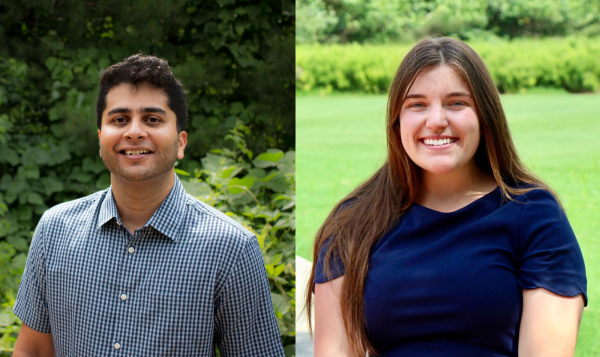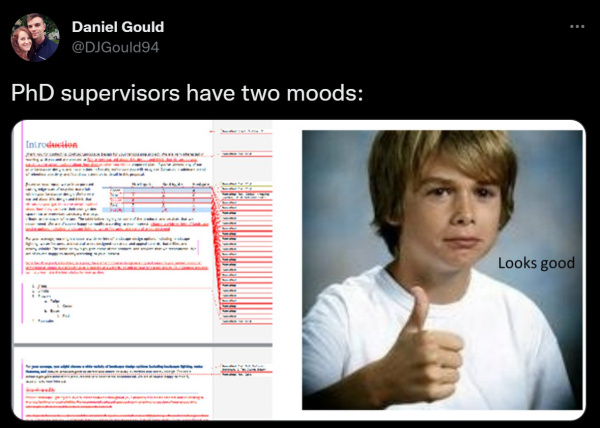Op-ed: A holistic Ph.D. experience at CCEE — tips for early-stage Ph.D. students
By Adi Keskar and Morgan DiCarlo

NC State’s Department of Civil, Construction, and Environmental Engineering is a great place for research. While you are already working on cutting-edge science as a graduate student in our department, here are some non-research tips that improved our overall experience while in the program. Who are we? We are two final-year Ph.D. students from Computing and Systems (Morgan, now Dr. DiCarlo) and Environmental, Water Resources, and Coastal Engineering (Adi, future Dr. Keskar). Our tips are not silver bullet solutions or things you should do, but they aligned with the spirit of sharing what helped us have a great Ph.D experience at CCEE. These suggestions come with action steps that we believe can help you build the support system needed to thrive in graduate school. (And, although they are numbered, they are not in order!) So take the tips that resonate with you, and ignore the ones that don’t.
- Network with faculty in other departments. Working with professors outside of civil engineering or inviting them to join your committee can help cast a wide net for research ideas and future job opportunities. NC State CCEE has faculty with a wide range of expertise. It’s a lot of fun talking with professors outside your discipline and bouncing ideas off them. It can also help you think of different dimensions to your research and think of new ways to tackle your research problem. Consider searching the available graduate certificate programs and pursuing an additional speciality during your time here. For example, Morgan completed a graduate certificate in Disaster Resilient, Policy, Engineering and Design, which accepted civil engineering courses as electives and allowed her to network with students and faculty in public policy and landscape architecture programs. Adi has professors from the School of Public Administration and the School of Natural Resources on his committee. If you can’t commit to a certificate, even just one course outside of your discipline—like Public Policy Process (Adi recommends this) or Water Economics (Morgan’s pick)—can help you gain a big-picture perspective and better contextualize your research.
- Reach out to the NC State Counseling Center. The NC State Counseling Center is a great resource to lean on during your Ph.D. Your Ph.D. work-life balance will ebb and flow with deadlines, and everyone manages that balance depending on their individual situation. However, leaning on the counseling services at NC State is a great way to ensure that you take care of your well-being. We highly recommend looking at the services they provide.
- Make yourself heard during research meetings. Research meeting structure varies amongst advisors. We’d like to offer some advisor-agnostic tips, though. More “things to keep in mind,” actually. First, at some point in your Ph.D., you will know the research weeds of the project better than your advisor. Keep that in mind. Your advisor would prefer you to speak up and offer an alternative solution earlier (rather than you biting your tongue to avoid being contradictory) if it saves both of you the extra effort later. Second and most importantly, remember that your advisors have multiple projects with multiple weekly research meetings, so don’t be surprised if they don’t remember a point you made in your last research meeting. Give them the background of your previous research meeting at the start of your meeting, or send them a summary email after every meeting that they can refer to before your meeting.
- Complain to your fellow graduate students; be a sounding board for others. Like any other job, you will have complaints or issues arise during your Ph.D. Complain about them to your fellow students. It is more than likely that some, if not all of them, have had a similar experience and could give you helpful suggestions. We write this tip to put it out there that no one has the perfect Ph.D. experience (some are more imperfect than others). Not to get too sentimental, but leaning on your fellow students during tough grad school experiences and also being that person people come to when they want to vent can have a great ripple effect on not just your Ph.D. experience but the department’s overall culture as well. We can both testify that being in CCEE, you will be in a very healthy graduate school environment with faculty and researchers who are doing cutting-edge research and are also very supportive.
 Take advantage of the writing resources on campus. The blank page will stare at you with its intense glare during your Ph.D. Writing, in general, can be intimidating. Writing papers for peer-reviewed journals, especially so. Luckily, we have some great resources on campus that will help you learn the art of writing a research article. Dr. KA’s “CE 610: Advanced Communication for Engineering Research” is a course that both the authors of this article have taken and benefited from. The CCEE Professional Development website has some great resources to use for refining your research writing. The Graduate School also has workshops and writing groups that could serve as great resources, and the Graduate Writing Center in the Academic Success Center of DH Hill Library provides one-on-one peer tutoring sessions at any stage of the writing process.
Take advantage of the writing resources on campus. The blank page will stare at you with its intense glare during your Ph.D. Writing, in general, can be intimidating. Writing papers for peer-reviewed journals, especially so. Luckily, we have some great resources on campus that will help you learn the art of writing a research article. Dr. KA’s “CE 610: Advanced Communication for Engineering Research” is a course that both the authors of this article have taken and benefited from. The CCEE Professional Development website has some great resources to use for refining your research writing. The Graduate School also has workshops and writing groups that could serve as great resources, and the Graduate Writing Center in the Academic Success Center of DH Hill Library provides one-on-one peer tutoring sessions at any stage of the writing process.
- Leverage all the resources available through NC State libraries. The NC State library system is unparalleled, but many people aren’t using all of these great resources! A non-exhaustive list the authors have tried: access to reference materials for the FE/PE exams; workshops on data visualization; drop-in Dataspace “office hours” to help you with coding questions; reserve rooms for coworking and studying; the Makerspace 3D printing; the Innovation Studio where you can submit your work to an on-campus museum space; and employment opportunities. For example, Morgan worked with the Peer Scholars program all four years of her Ph.D., which provides domestic students paid opportunities to teach short courses. The libraries can also provide support for securing funding, including Morgan’s recorded course on National Science Foundation Graduate Research Fellowships. Adi has collaborated with the libraries staff for many events, including research seminars and a screening of the movie “Beasts of the Southern Wild” as a part of the University’s Energy Week. The library staff are always looking for collaborators and finding innovative ways for students to share their knowledge.
- Build professional networks and join student organizations starting early in your Ph.D. Sometimes, there might not be an organization that aligns with your focus area. Our campus has great resources for you to start one yourself. Adi was the co-founder of the Student Energy Club on campus, and over the past two years, it has grown to be a central hub for the energy community on our campus. He raised more than $30,000 of funding for the organization through grants from the campus Sustainability Fund. Student professional network and organization work can be especially helpful during interviews and postdoctoral fellowship applications, since you can list these as service duties. It also gives interviewers a chance to see you thrive in non-research activities. Morgan was a mentorship coordinator for the Professional Engineers of North Carolina (PENC) student chapter, which involved hosting a networking program between students and local engineers and Boy and Girl Scouts hands-on engineering experiences. She’s continuing with the organization as a member of the local chapter’s executive board. Additionally, the experiences can help you network with state and federal policymakers from your field who can guide you in implementing your research with real-world policy constraints.
Finally, we would like to reinforce that each Ph.D. journey will have its own challenges, timeline, and rewards. We hope these tips serve as helpful guideposts to you as a Ph.D. student in our department.